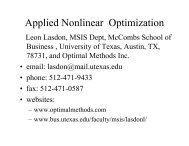Sunday
Sunday
Sunday
You also want an ePaper? Increase the reach of your titles
YUMPU automatically turns print PDFs into web optimized ePapers that Google loves.
SB67<br />
■ SB67<br />
67- Ellis East- Hyatt<br />
System Reliability and Maintenance<br />
Sponsor: Quality, Statistics and Reliability<br />
Sponsored Session<br />
Chair: Nan Chen, Assistant Professor, National University of Singapore,<br />
Department of Industrial and Systems Eng, 1 Engineering Drive 2,<br />
Singapore, 129789, Singapore, isecn@nus.edu.sg<br />
1 - Criticality Index for Degrading Components under<br />
Dynamic Environments<br />
Xiao Liu, liuxiaodnn_1@hotmail.com, Khalifa N. Al-Khalif,<br />
Dingguo Hua, Abdel Magid Hamouda, David Coit, Elsayed Elsayed<br />
Criticality index of a component depends on its degradation path and system<br />
configuration. This presentation investigates the criticality analysis for degrading<br />
components under dynamic environmental conditions. The component<br />
degradation is modeled by a k-dimensional Wiener process, and component fails<br />
when any of these k degradation paths attains its own threshold level. In the<br />
numerical examples, we illustrate the computation of component criticality in<br />
different system configurations.<br />
2 - A Quantile Regression Approach to Analyze Accelerated Life<br />
Testing Data<br />
Nan Chen, Assistant Professor, National University of Singapore,<br />
Department of Industrial and Systems Eng, 1 Engineering Drive 2,<br />
Singapore, 129789, Singapore, isecn@nus.edu.sg<br />
We propose a quantile regression framework to model the accelerated life tests<br />
(ALT) data. The quantile of the failure distribution at usage level can be easily<br />
estimated. Compared with traditional parametric regression methods, quantile<br />
regression is distribution free, efficient in presence of censoring, and is more<br />
flexible in modeling ALT relations. In addition, the method can be used naturally<br />
in the cases when the failure-free life depends on the accelerating factor.<br />
3 - An Integrated Approach to the Design of Statistically Precise<br />
and Energy Efficient Accelerated Tests<br />
Haitao Liao, Associate Professor, University of Arizona, Tucson, AZ,<br />
85721, United States of America, hliao@email.arizona.edu,<br />
Dan Zhang<br />
In this paper, an integrated experimental design approach is introduced with the<br />
objective of maximizing the reliability estimation precision while minizing the<br />
energy consumption of an accelerated test. Relevant statistical inference methods<br />
and required experimental needs and technologies are discussed.<br />
4 - Reliability and Maintenance for Dependent Competing Failure<br />
Processes with Shifting Thresholds<br />
Qianmei Feng, Associate Professor, Houston University, E206<br />
Engineering Bldg 2, Houston University, Houston, TX, 77204-<br />
4008, United States of America, qmfeng@uh.edu, Lei Jiang,<br />
David Coit<br />
We present reliability and maintenance models for systems subject to multiple<br />
dependent competing failure processes with a changing and dependent failure<br />
threshold. Three cases of dependency between shock process and hard failure<br />
threshold level are studied. Reliability models are developed based on degradation<br />
and random shock modeling. Two preventive maintenance policies are also<br />
applied and compared. Then an MEMS example is given to demonstrate the<br />
reliability models and maintenance polices.<br />
■ SB68<br />
68- Suite 312- Hyatt<br />
Finance: Risk Management<br />
Contributed Session<br />
Chair: Woojin Chang, Seoul National University, Gwanak-gu<br />
Gwanak-ro 1, Seoul, Korea, Republic of, changw@snu.ac.kr<br />
1 - Continuous Dynamic Portfolio Choice with Bayesian Regret<br />
Shea Chen, University of California, Berkeley, 301 Main St.,<br />
Unit 34E, San Francisco, CA, 94105, United States of America,<br />
sheachen@berkeley.edu, Andrew Lim<br />
We formulate a continuous-time portfolio choice problem in which the investor is<br />
uncertain about parameters of the model, and the objective function is a Bayesian<br />
version of relative regret. The optimal portfolio is characterized and shown to<br />
involve a “tilted” posterior, where the tilting is defined in terms of a family of<br />
stochastic benchmarks.<br />
INFORMS Phoenix – 2012<br />
102<br />
2 - Forecasting the Stress of Credit Card Portfolios<br />
Mee-chi So, University of Southampton, Southampton<br />
Management School, Southampton, SO17 1BJ, United Kingdom,<br />
m.so@soton.ac.uk<br />
This study aims to develop models to forecast the default rate of credit card<br />
accounts under different economic scenarios. Two modelling approaches were<br />
extended to include the impact of lenders’s actions within the model. The first<br />
approach was a regression model of the aggregate losses based on economic<br />
variables. The second approach was a set of vintage level models which<br />
highlighted the months on books effect on credit losses. A case study using the<br />
models was described.<br />
3 - Credit Rating Migration Model: Markov Switching Process<br />
Woojin Chang, Seoul National University, Gwanak-gu Gwanak-ro<br />
1, Seoul, Korea, Republic of, changw@snu.ac.kr, Sung Yeol Oh<br />
We develop a credit rating migration model based on a discrete-time discretevalued<br />
Markov process depending on hidden Markov chain. We also present a<br />
parameter estimation procedure for the proposed model using the EM algorithm.<br />
The likelihood ratio test shows that our model depending on hidden Markov<br />
chain better describes the credit rating dynamics than a benchmark Markov chain<br />
model.<br />
4 - A Model for Dynamic TaxCredit Utilization<br />
Nilofar Varzgani, PhD Student, Rutgers University, Rutgers<br />
Business School, Newark, NJ, 07102, United States of America,<br />
nilofarv@pegasus.rutgers.edu, Suresh Govindaraj,<br />
Michael Katehakis<br />
We develop a new stochastic dynamic programming model for dynamic tax credit<br />
utilization for a firm that provides maximum expected benefit over a rolling<br />
horizon. The model takes into account earnings and profits, net operating losses,<br />
and credit carryovers. We present computation to demonstrate the benefit the<br />
model provides.<br />
■ SB69<br />
69- Suite 314- Hyatt<br />
Data Driven Portfolio Optimization<br />
Cluster: Optimization in Finance<br />
Invited Session<br />
Chair: Victor DeMiguel, Professor, London Business School, Regent’s<br />
Park, London, NW1 4SA, United Kingdom, avmiguel@london.edu<br />
1 - Computing General Arbitrage Bounds for European Basket<br />
Options via Dantzig-Wolfe Decomposition<br />
Luis Zuluaga, Assistant Professor, Lehigh University,<br />
200 West Packer Ave., Bethlehem, United States of America,<br />
luis.zuluaga@lehigh.edu<br />
We study the problem of computing bounds on the price of a basket option given<br />
the only assumption of absence of arbitrage, and information about prices of<br />
other basket options. We provide a simple way to compute this type of bounds via<br />
a suitable Dantzig-Wolfe decomposition. We illustrate our results by computing<br />
upper and lower arbitrage bounds on gasoline/heating oil crack spread options,<br />
and Alternative Risk Transfer (ART) products.<br />
2 - Performance-based Regularization in Mean-CVaR Portfolio<br />
Optimization<br />
Gah-Yi Vahn, Assistant Professor, London Business School,<br />
Regent’s Park, London, United Kingdom, gvahn@london.edu,<br />
Noureddine El Karoui, Andrew Lim<br />
We introduce performance-based regularization (PBR), a new approach to<br />
addressing estimation risk in data-driven optimization, to mean-CVaR portfolio<br />
optimization. We assume the available log-return data is iid, and detail the<br />
approach for two cases: nonparametric and parametric (the log-return<br />
distribution belongs in the elliptical family). We show that the PBR methods<br />
produce efficient frontiers that are, on average, closer to the population efficient<br />
frontier with less variability.<br />
3 - Size Matters: Optimal Calibration of Shrinkage Estimators for<br />
Portfolio Selection<br />
Alberto Martin-Utrera, Mr, University Carlos III of Madrid,<br />
C/ Madrid, 126-28903, GETAFE, Sp, 28903, amutrera@estecon.uc3m.es<br />
We carry out a comprehensive investigation of shrinkage estimators in the<br />
context of portfolio optimization and we make several contributions to this field.<br />
First, we propose new shrinkage estimators for both the moments of asset returns<br />
and portfolio weights. Second, we propose novel calibration criteria to compute<br />
the optimal shrinkage intensity. Finally, we propose a parametric and a<br />
nonparametric approach to estimate the shrinkage intensity.



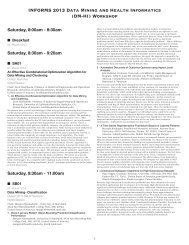
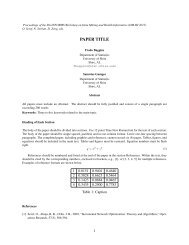
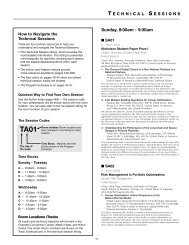
![[PDF] Charlotte Back Matter](https://img.yumpu.com/17933057/1/190x245/pdf-charlotte-back-matter.jpg?quality=85)
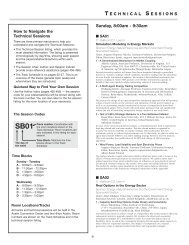
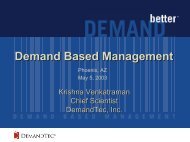
![[PDF] ALIO Back Matter](https://img.yumpu.com/17932960/1/190x245/pdf-alio-back-matter.jpg?quality=85)
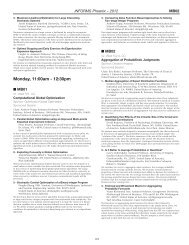
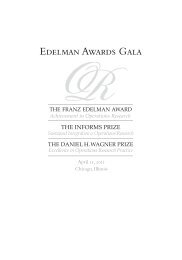
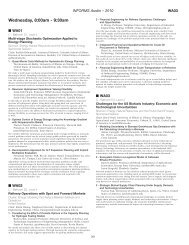
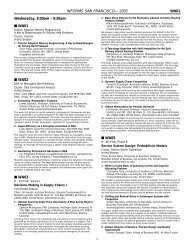
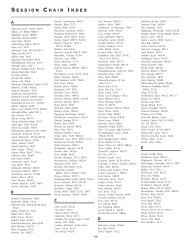
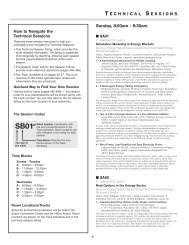
![[PDF] Monday, 8:00am - 9:30am](https://img.yumpu.com/17932954/1/190x245/pdf-monday-800am-930am.jpg?quality=85)
